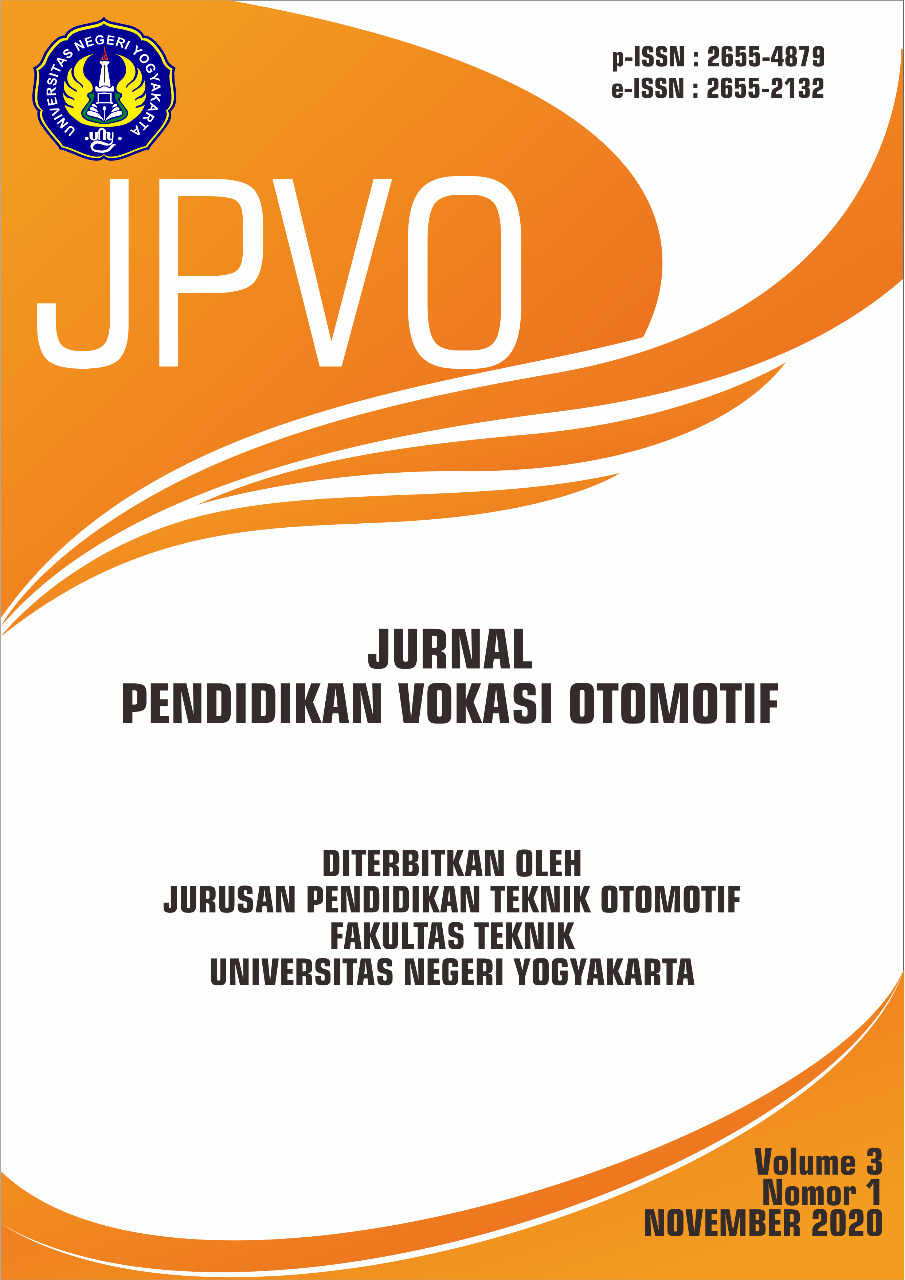IMPLEMENTASI PEMBELAJARAN JARAK JAUH PADA KOMPETENSI KEAHLIAN TEKNIK KENDARAAN RINGAN OTOMOTIF DI SMKN 1 SEDAYU
DOI:
https://doi.org/10.21831/jpvo.v4i1.45585Keywords:
Implementation, Learning, PJJAbstract
References
Ali, M. 1993. Strategi Penelitian Pendidikan. Bandung: PT Angkasa Raya.
Ali, M. 2009. Pendidikan untuk Pembangunan Nasional. Jakarta: Grasindo.
Cahyati, Nika. 2020. Peran Orang Tua Dalam Menerapkan Pembelajaran di Rumah Saat Pandemi Covid19. Jurnal Golden Age, Universitas Hamzanwadi, 04(1).
Hanafy, M. S. 2014. Konsep Belajar dan Pembelajaran. Lentera Pendidikan, 17(1), 66-79.
https://bersamahadapikorona.kemdikbud.go.id/wp-content/uploads/2020/05/SE-Sesjen-Nomor-15-Tahun-2020-2.pdf. Dikutip pada tanggal 13 Juni 2021 21.15.
Khalimah, Siti N. 2020. Peran Orangtua Dalam Pembelajaran Daring di MI Darul Ulum Pedurungan Kota Semarang Tahun Pelajaran 2020/2021. Salatiga: Institut Agama Islam Negeri Salatiga.
Mulyadi, E. 2015. Penerapan Model Project Based Learning untuk Meningkatan Kinerja dan Prestasi Belajar Fisika Siswa SMK. Jurnal Pendidikan Teknologi dan Kejuruan, 22(4), 385-395.
Mulyasa, E. 2012. Manajemen Pendidikan Karakter. Jakarta: Bumi Aksara.
Nurbiyanto, E. 2019. Implementasi Problem Based Learning untuk Meningkatkan Hasil Belajar Siswa Kelas XI Jurusan TKR SMK Negeri 2 Yogyakarta. Jurnal Pendidikan Vokasi Otomotif, 2(1), 115-126.
Nurodanika, M. 2020. Analisis Pembelajaran Daring Sebagai Dampak Pandemi Covid-19 pada Mata Pelajaran Produktif Kompetensi Keahlian Teknik dan Bisnis Sepeda Motor Siswa Kelas XII TBSM SMK PIRI Sleman. Skripsi. Yogyakarta: FT UNY.
Nuryana, A, N. 2020. Dampak Pandemi Covid-19 Terhadap Dunia Pendidikan. https://kabar-priangan.com. Diakses 18 Januari 2021 jam 23:02.
Partyaningsih. 2020. Analisis Penggunaan Media Daring Era Covid-19 terhadap Motivasi Belajar PAI dan Budi Pekerti pada Siswa Kelas X SMK Negeri 1 Salatiga Tahun Ajaran 2019/2020. Skripsi. Salatiga: IAIN Salatiga.
Prabowo, M. 2020. Persepsi Siswa Kelas XII Terhadap Pembelajaran Daring dalam Mata Pelajaran Pendidikan Jasmani Olahraga dan Kesehatan pada Masa Pandemi Covid-19 di SMAN 1 Bintan Timur Provinsi Kepulauan Riau Tahun 2020. Skripsi. Yogyakarta: FIK UNY.
Pujiriyanto. 2012. Teknologi untuk Pengembangan Media dan Pembelajaran. Yogyakarta: UNY Press.
Setiawan, N. 2020. Pengembangan Modul Pada Mata Pelajaran Produkkreatif dan Kewirausahaan Untuk Siswa Kompetensi keahlian Teknik Kendaraan Ringan Otomotif SMKN 2 Pengasih. Jurnal Pendidikan Vokasi Otomotif, 3(1), 95-108.
Setiyati, S. 2014. Pengaruh Kepemimpinan Kepala Sekolah, Motivasi Kerja, dan Budaya Sekolah Terhadap Kinerja Guru. Jurnal Pendidikan Teknologi dan Kejuruan, 22(2), 200-207.
Suyono & Hariyanto. 2014. Belajar dan Pembelajaran. Bandung: PT Remaja Rosdakarya.
Widiatna, D. A. 2019. Teaching Factory: Arah Baru Manajemen Sekolah Menengah Kejuruan di Indonesia. Jakarta: Pustaka Aji.
Yaumi, M. 2018. Media dan Teknologi Pembelajaran. Jakarta: Prenadamedia Group.
Downloads
Published
How to Cite
Issue
Section
Citation Check
License
Jurnal Pendidikan Vokasi Otomotif allows readers to read, download, copy, distribute, print, search, or link to the full texts of its articles and allow readers to use them for any other lawful purpose. The journal allows the author(s) to hold the copyright without restrictions. Finally, the journal allows the author(s) to retain publishing rights without restrictions

Jurnal Pendidikan Vokasi Otomotif is licensed under a Creative Commons Attribution-ShareAlike 4.0 International License.
Based on a work at https://journal.uny.ac.id/index.php/jpvo.









